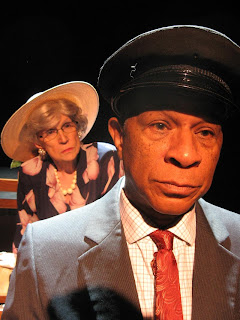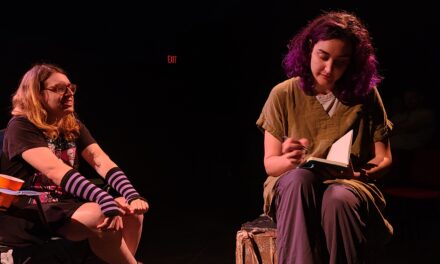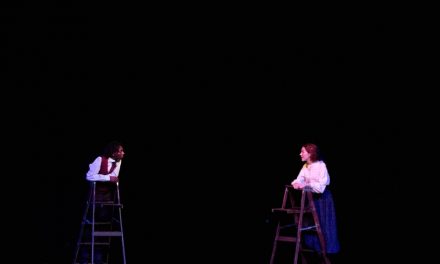 |
| Della Browne & Clyde Tyrone Harper in Driving Miss Daisy. Photo courtesy of Bunbury Theatre. |
Driving Miss Daisy
Written by Alfred Uhry
Directed by Jon Huffman
Reviewed by Keith Waits
Entire contents copyright © 2012 Keith Waits. All rights reserved.
After a popular play becomes an equally popular movie, often the movie redefines the profile of the material, and not always in a positive way. Driving Miss Daisy’s film adaptation is actually very good – faithful to the original story and containing performances that, if not definitive, represent the characters extremely well. Still, it was a distinct pleasure to return to the source material in Bunbury Theatre’s season opener.
It proves a welcome reminder of how lean and economical the script is. An episodic structure tracks the relationship of Daisy Werthan, an aging Southern widow, and Hoke Colburn, an African-American man hired by Daisy’s son, Boolie, to serve as her chauffeur. It is a premise that could easily slip into mawkish sentimentality, but playwright Alferd Uhry shows discipline and restraint in charting the transition from prickly conflict to acceptance and then profound friendship. Each scene is brief and focused on a new phase in the developing relationship, succinctly sketching in an understanding of what has passed between each moment shared with the audience. There is no intermission, and in a swift eighty-odd minutes, we have shared in a story of extraordinary intimacy that touches lightly upon cataclysmic social change that defined the American experience in the 1960s.
Clyde Tyrone Harper is near-perfect as Hoke, contrasting the overly-subservient manners that were second nature to black Americans in the years before the civil rights movement, against the inviolate integrity that is the character’s foundation. He brings understatement and sly humor to the role in equal measure. Della Browne has appeared in several previous Bunbury productions, usually bringing a tart and sassy comedic presence to her supporting roles. She uses those qualities to good effect in this larger role, but also finds the gentle pathos and humanity of Daisy as she shifts from intolerance to understanding. As her son Boolie, Tony Prince effortlessly builds a bridge between Hoke and Daisy, yet brings enough presence to keep the character from fading into a storytelling device.
Director Jon Huffman plays it straight with the material, leading the actors in an effective discovery of the truth of the text and keeping the handsomely mounted production as clean and straightforward as the script. The design work is understated but in good service to the script, with a nice selection of songs helping to establish period without being too clichéd.
Driving Miss Daisy is a deceptively simple text that touches upon complex ideas through the use of small moments and gestures. The long relationship between Hoke and Daisy is given its most powerful expression in such moments, so that the play ends on a gentle note of grace and humanity between people bonded together against all odds.
Driving Miss Daisy
October 12- 28
Thursdays – Saturdays: 7:30 p.m.
Sundays: 2:30 p.m. and 7:30 p.m.
[No Sunday evening performance October 28.]
[No Sunday evening performance October 28.]
Bunbury Theatre
at the Henry Clay
604 S. Third Street
Louisville, Kentuckky
(502) 585-5306




